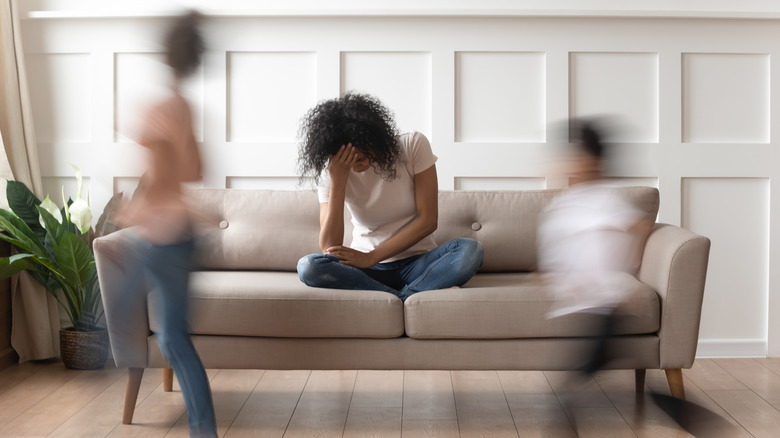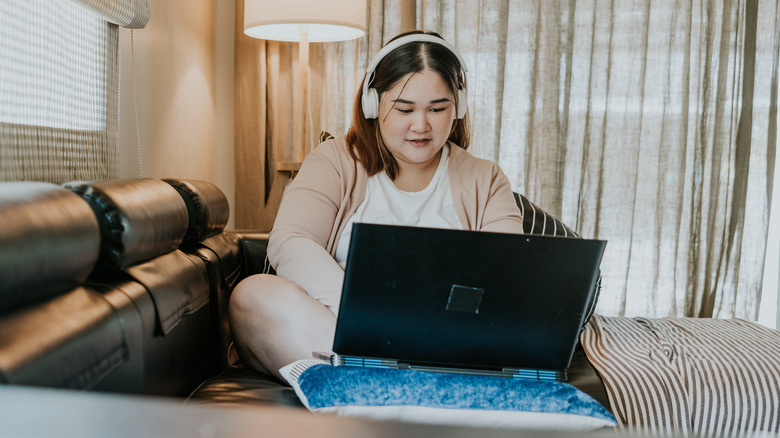Neurodivergence In Women Is Still Being Misdiagnosed And The Consequences Can't Be Ignored
Neurodiversity refers to the wide range of thinking or diversity of brain functions that we all have. It's the acknowledgment that everyone's brain functions uniquely — that we all experience the world differently and have different styles of thinking, communicating, and processing information. The underdiagnosis (neurodivergent traits being ignored) and misdiagnosis (neurodivergent traits diagnosed incorrectly as something else) of neurodiverse women have led them to self-diagnose — many of them via TikTok — in an effort to spread awareness and understand themselves better. But diagnosing yourself based on the information you consume on social media can have harmful consequences, such as not receiving the proper mental health and physical care for your unique condition or medical issue.
There are numerous types of neurodivergence, but some of the more commonly heard ones are autism, ADHD, dyslexia, dyspraxia, and Tourette's Syndrome. Being neurodivergent can also include disorders like anxiety and depression, obsessive-compulsive disorder, and epilepsy. With such a wide range of conditions and ways to treat them or make accommodations, it's important to prevent spreading misinformation that could result in an incorrect self-diagnosis.
Why are women self-diagnosing?
According to the CDC, boys are about four times more likely than girls ages 3 to 17 to be diagnosed with autism spectrum disorder (ASD), and about twice as likely to be diagnosed with attention-deficit/hyperactivity disorder (ADHD). Also, per The Brain Charity, AFAB people (those assigned female at birth) are diagnosed with ADHD much later in life, normally in their 30s or 40s, compared to AMAB people (those assigned male at birth) who tend to receive diagnoses around age 7. This underdiagnosis is partly due to the fact that neurodiverse conditions like autism and ADHD often look different in girls and women than they do in boys and men, and the traits may present more subtly and be harder to detect. It's also a reflection of the gender bias in medical and psychological diagnosis. This disparity has led many women and AFAB people who have always felt a little, or significantly different from others to self-diagnose themselves in adulthood.
One woman, who posted a now deleted TikTok video explaining how surprised her coworker was when she told her she was autistic, described how she has neurodiverse traits that aren't necessarily the stereotypical autistic attributes that uninformed people think of. She received a multitude of cruel comments from TikTokers such as, "This, ladies and gentlemen, is the result of the over-diagnosis generation," and "Another example of someone trying to make themself sound more interesting than they actually are." However, others supported her, saying, "We're not all like Rain Man," and "Every autistic person is different so of course she isn't gonna be exactly like your nephew's uncle's neighbor."
What's the harm in using social media to self-diagnose?
There are potential benefits to using social media as a source for finding answers. If you've experienced various mental and physical conditions that you haven't been able to receive clarity on from a doctor, you may be able to learn from others' personal experiences. However, it can also be dangerous to believe everything we see or hear; A 2022 study on the use of social media platforms to spread mental health information found that 52% of 100 ADHD TikTok videos were misleading. According to Hope Bridge, Dr. Taryn Goldberg, PhD, NCSP affirms, "It's great that many adolescents on TikTok are open to talking about their diagnoses, but we are seeing other kids using those videos to self-diagnose." Someone might believe they have autism because they have those traits, but "in actuality, they may need support for something entirely different," she says. For example, there are overlapping symptoms of autism and anxiety that could cause confusion for individuals attempting to diagnose themselves through information on TikTok.
Taking an online assessment for ADHD or autism, as many self-diagnosed TikTokers have done themselves, might also show that you are indeed neurodivergent, but as Dr. Lawrence Fung, MD, Ph.D. says to Women's Health, a diagnosis "is really not cut and dry, and it's not about a checklist." Assessments for neurodivergent conditions are most effective if given under the guidance of a doctor who can provide context and a more thorough examination.


